Afiya Amesu
2024 British Pegasus Scholar Report
A Complex Relationship with Race and the Legal System
The history of the United States is shaped by its legacy of slavery, segregation, and racial inequality. This legacy has left a profound impact on the legal system, influencing the development of laws, the administration of justice, and the experiences of marginalised communities. Systemic inequality remains visible in disparities across the criminal justice system, access to legal representation, and broader inequities. The legal sector, as a reflection of society, has grappled with the challenge of addressing these deeply rooted issues while striving to uphold the principles of equality and justice for all.
Notwithstanding this history, significant strides have been made toward fostering greater representation and inclusivity in the US legal profession. The judiciary, in particular, has seen advancements in diversity, with more judges from historically underrepresented communities assuming positions on the bench. These developments are not only critical for enhancing public trust in the justice system, but also for ensuring that the profession reflects the communities it serves.
Against this background, my interest in the Pegasus scholarship was piqued. In the UK, only 3% of barristers and just over 1% of judges are Black which, coupled with disproportionately high rates of incarceration of Black people, risks diminishing public confidence in the legal system and can limit the breadth of perspectives necessary for delivering fair and inclusive justice. The scholarship, for me as a Black barrister, was an opportunity to learn more about how positive action can lead to greater diversity and inclusion.
In setting out the key experiences of this programme, I have focussed my core reflections on the judiciary, Indigenous law, advocacy, legislative insights and the power of the collective legal community below.
The Judiciary
California was the first leg of the programme and here I observed how the Californian bench has actively sought to embody the diversity of the communities it represents. Over the last 18 years, the number of Asian, Black, and Hispanic judicial officers in California has doubled. This was no mean feat, and the extent of the achievement compelled me to enquire about the approaches the State had pursued to promote and accelerate access to the bench.
Over lunch at the Sutter Club, Governor Newsom’s Judicial Appointments Secretary Luis Céspedes offered invaluable insight into this. In his role Luis advises the governor on the appointment of judges and justices to the California courts, and underpinning this is a commitment to justice and equal rights. In our conversation Luis aptly highlighted that promoting diversity was not synonymous with undermining a meritocracy. In fact, with the right support, transparency in the application process and an appreciation of varied legal and non-legal experience, candidates from all backgrounds can become eligible to apply. Discussions with Ninth Circuit Judge Connie Callahan further developed these insights, highlighting the role mentorship plays in the journey toward greater inclusion. Specifically, how it aided building connections with those who hold differing opinions, so one’s own worldview does not become myopic.
The meetings I had with state and federal judges in California exemplified how this approach to judicial appointment successfully attracts talented adjudicators from every background. Our judicial meetings started with Justice Shama Mesiwala at the California Court of Appeal, Third Appellate District. Accompanied by some exquisite brownie-biscuits, our discussion provided profound insights into appellate practice, judicial decision-making at the state level, and the imperative, for her as an Asian woman on the bench, of fostering greater diversity and representation within the judiciary. Justice Mesiwala's passion for equity and inclusion was palpable and set the tone for what was to become a series of inspiring and thought-provoking engagements.
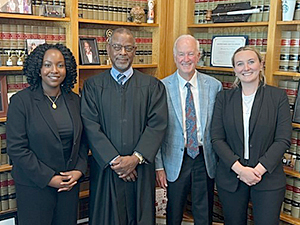 We then went on to meet Chief Judge Troy Nunley. During our time with him, we had the opportunity to witness Chief Judge Nunley’s sentencing of two defendants for the distribution of fentanyl. The import of the case was particularly significant in that deportation would inevitably follow the completion of their custodial sentences. We observed him exercise the delicate balance of acknowledging the gravity of the offence and its societal ramifications, while still recognising the humanity of the individuals before the court. The delivery of this sentence by the judge provided incredibly insightful lessons in how the disposition of the judiciary must be one of self-possession and cool headedness, even in the most serious of circumstances.
We then went on to meet Chief Judge Troy Nunley. During our time with him, we had the opportunity to witness Chief Judge Nunley’s sentencing of two defendants for the distribution of fentanyl. The import of the case was particularly significant in that deportation would inevitably follow the completion of their custodial sentences. We observed him exercise the delicate balance of acknowledging the gravity of the offence and its societal ramifications, while still recognising the humanity of the individuals before the court. The delivery of this sentence by the judge provided incredibly insightful lessons in how the disposition of the judiciary must be one of self-possession and cool headedness, even in the most serious of circumstances.
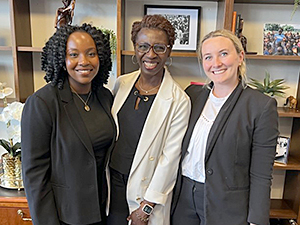 Meeting Sacramento County Superior Court Presiding Judge Bunmi Awoniyi, the first Black judge to hold this position, was a standout moment of the state court experience. Judge Awoniyi’s story, from practising as a British barrister to sitting as a presiding judge in California, was deeply motivational, highlighting the very real power of aiming high and striving toward one’s goals. Her journey shifted my perspective on what I could achieve at the Bar, while also broadening my vision for personal growth.
Meeting Sacramento County Superior Court Presiding Judge Bunmi Awoniyi, the first Black judge to hold this position, was a standout moment of the state court experience. Judge Awoniyi’s story, from practising as a British barrister to sitting as a presiding judge in California, was deeply motivational, highlighting the very real power of aiming high and striving toward one’s goals. Her journey shifted my perspective on what I could achieve at the Bar, while also broadening my vision for personal growth.
From the Sacramento Superior Court we went to the California Supreme Court, having conversations with Chief Justice Patricia Guerrero and Justices Martin Jenkins and Carol Corrigan. These meetings offered a thought-provoking deep dive into their judicial philosophies and approaches to interpreting the law. Justice Jenkins left a particularly lasting impression with his eloquence, his genuine interest in our careers, and his warmth, making the encounter feel like a reunion with an old mentor rather than a first meeting.
These judges illustrated how diversity on the bench strengthens the administration of justice, fostering a more nuanced understanding of the challenges faced by underrepresented communities. Judges from diverse backgrounds bring invaluable perspectives informed by their lived experiences, shaping how they interpret the law and adjudicate cases in ways that resonate with a wider cross-section of society.
Indigenous Law
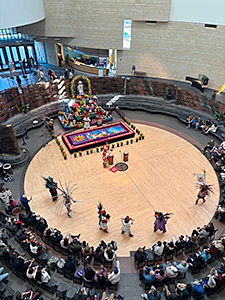 To further expand our understanding of how the US legal system has adapted to tackle deeply entrenched racial issues, we had the opportunity to gain insight into Tribal law and how it interacts with federal and state law. Attending a lecture at Arizona State University provided me with a comprehensive overview of the complexities and nuances of Indigenous law, highlighting the unique legal frameworks that govern Native American tribes. I also had the opportunity to visit the university’s legal clinic, which serves indigenous clients, offering me valuable insight into the legal challenges faced by these communities, particularly in areas such as land rights, voting rights, sovereignty, and cultural preservation.
To further expand our understanding of how the US legal system has adapted to tackle deeply entrenched racial issues, we had the opportunity to gain insight into Tribal law and how it interacts with federal and state law. Attending a lecture at Arizona State University provided me with a comprehensive overview of the complexities and nuances of Indigenous law, highlighting the unique legal frameworks that govern Native American tribes. I also had the opportunity to visit the university’s legal clinic, which serves indigenous clients, offering me valuable insight into the legal challenges faced by these communities, particularly in areas such as land rights, voting rights, sovereignty, and cultural preservation.
Visits to the Heard Museum in Phoenix and the Native American museum in Washington DC further deepened my understanding of the rich history of the different federally recognised tribes by showcasing both historic and contemporary art. One of the most intriguing experiences of the programme was judging a moot at George Mason University, which centred on the adoption of a Native American child by a white family. This case, centred on the intersection of federal Indian law and child welfare, emphasised the importance of the Indian Child Welfare Act (ICWA) in preserving Native American families and culture.
The above helped to contextualise the significance of the appointment of Judge Lomayesva to the superior court in California. During my time in California, she became the first member of a California federally recognised Indian tribe to be appointed to the superior court in the state and the first California Native American to be appointed to the San Diego Superior Court. These experiences collectively deepened my appreciation for the legal intricacies surrounding indigenous peoples and reinforced the importance of preserving their legal rights and cultural heritage.
Advocacy
Alongside exploring how diverse representation can be fostered within the legal sector, I saw the Pegasus programme as an opportunity to explore approaches to advocacy through a US lens.
I’ll start with Chicago, where we witnessed pre-trial advocacy in the form of a deposition. We spent some time with Lance Northcutt of Salvi, Schostok & Pritchard PC, who was working on a high-speed car chase that resulted in a fatality. We witnessed the deposition of an expert witness and saw how, strategically, a party can begin to shape and present their case. This interactive aspect of discovery, where parties gather sworn testimony before trial, stood in stark contrast to the UK’s reliance on written statements and reports during disclosure. It was a vivid demonstration of the procedural and cultural distinctions between our legal systems and caused me to question whether, if adopted in the UK, it could improve the quality of evidence given by witnesses.
Further, witnessing jury selection and the commencement of a trial at the US District Court in Phoenix emphasised the pivotal role of voir dire in American trials. Unlike the relatively passive jury selection process in the UK, voir dire in the US is highly interactive, with attorneys actively questioning potential jurors to uncover biases and assess their suitability. This process shed light on a form of advocacy that commenced even before the trial, offering lawyers the chance to shape jury composition—a stark contrast to the UK’s random selection model. In every state, our US colleagues were consistently surprised by the absence of both depositions and voir dire in the UK legal system given their fundamental importance in US litigation.
In addition to observing pre-trial advocacy, we witnessed court advocacy at state and federal level. From observing a ‘pro se’ defendant charged with grievous bodily harm, cross-examining witnesses in a jury trial in the Annapolis criminal courts, watching protective and peace order proceedings presided over by Judge Nyce in the District Court, to observing timed oral arguments before the Maryland Supreme Court provided a fascinating contrast to the more practical workings of the different state courts.
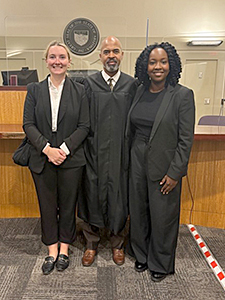 Then engaging with legal professionals operating at the highest echelons of federal law, including Assistant Attorney General Kristen Clarke, Christopher Fonzone from the Office of Legal Counsel, and Solicitor General Elizabeth Prelogar, revealed the nature of political appointments and government litigation. Attending Supreme Court oral arguments on election day was particularly interesting. This experience was enriched by previously observing a mock argument at Georgetown Law, which showcased the meticulous preparation attorneys undergo to ensure concise and persuasive submissions.
Then engaging with legal professionals operating at the highest echelons of federal law, including Assistant Attorney General Kristen Clarke, Christopher Fonzone from the Office of Legal Counsel, and Solicitor General Elizabeth Prelogar, revealed the nature of political appointments and government litigation. Attending Supreme Court oral arguments on election day was particularly interesting. This experience was enriched by previously observing a mock argument at Georgetown Law, which showcased the meticulous preparation attorneys undergo to ensure concise and persuasive submissions.
The programme also encouraged me to consider how court advocacy can be utilised in innovative contexts. Phoenix showcased progressive justice solutions, particularly through its Maricopa County Veteran, Mental Health, and Community Courts. These nationally acclaimed courts demonstrated how specialised approaches in courts could address root causes, such as substance abuse, mental health issues, and homelessness, to reduce recidivism and improve individual outcomes. This was a compelling example of “law in action,” where partnerships between courts and service providers not only deliver treatment but also foster sustainable habits and long-term stability for vulnerable people.
Legislation
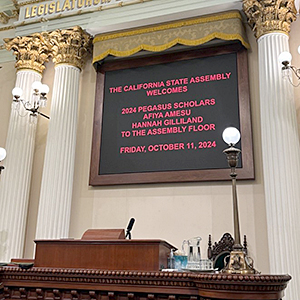 After observing law in action, the exploration of the federal and state enactment of statutes offered valuable insights into the processes that shape and drive the evolution of US legislation. At state level, a visit to the State Capitol and Assembly Chamber provided an insightful glimpse into California’s legislative process. Engaging with Legislative Counsel Cara Jenkins, Policy Advisor Emily Rodriguez, and other experts shed light on the stages of policy making. These lessons were complemented by meetings with employment attorneys Jill Telfer and Lisa Ryan, who provided valuable insights about the implementation of legislation from claimant and defendant perspectives. We also explored Maryland’s legislative processes, particularly the part-time structure of the state’s House of Delegates and Senate. Delegate Luke Clippinger shared candidly about the difficult balance between legislative responsibilities alongside full-time work, shedding light on the challenges and rewards of public service.
After observing law in action, the exploration of the federal and state enactment of statutes offered valuable insights into the processes that shape and drive the evolution of US legislation. At state level, a visit to the State Capitol and Assembly Chamber provided an insightful glimpse into California’s legislative process. Engaging with Legislative Counsel Cara Jenkins, Policy Advisor Emily Rodriguez, and other experts shed light on the stages of policy making. These lessons were complemented by meetings with employment attorneys Jill Telfer and Lisa Ryan, who provided valuable insights about the implementation of legislation from claimant and defendant perspectives. We also explored Maryland’s legislative processes, particularly the part-time structure of the state’s House of Delegates and Senate. Delegate Luke Clippinger shared candidly about the difficult balance between legislative responsibilities alongside full-time work, shedding light on the challenges and rewards of public service.
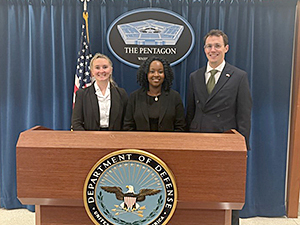 At a national level, our time in Washington DC offered a unique opportunity to delve into the workings of the federal legal system. Guided tours of the Capitol, the House Floor, and the Pentagon with Judge James Sweet provided insights into the country’s decision-making processes and defence mechanisms, bringing to life the intersection of politics and policy. In particular, standing on the House Floor, where historic debates have shaped the nation’s trajectory, was immensely significant. Our visits to the National Archives and the Library of Congress deepened this understanding, offering a rare glimpse into the careful preservation of legal records, documents drafted by the founding fathers, and artifacts that collectively formed the backbone of American democracy. Seeing the original documents that have shaped the country's legal systems was a humbling reminder of the power of both the written law and the enduring commitment of the nation's legislature to safeguard these legacies for future generations. A trip to Mount Vernon, the historic home of George Washington, provided a fitting pairing to these experiences. Looking at the life and legacy of the first US president was a poignant reminder of the values that first guided the nation and its legal systems.
At a national level, our time in Washington DC offered a unique opportunity to delve into the workings of the federal legal system. Guided tours of the Capitol, the House Floor, and the Pentagon with Judge James Sweet provided insights into the country’s decision-making processes and defence mechanisms, bringing to life the intersection of politics and policy. In particular, standing on the House Floor, where historic debates have shaped the nation’s trajectory, was immensely significant. Our visits to the National Archives and the Library of Congress deepened this understanding, offering a rare glimpse into the careful preservation of legal records, documents drafted by the founding fathers, and artifacts that collectively formed the backbone of American democracy. Seeing the original documents that have shaped the country's legal systems was a humbling reminder of the power of both the written law and the enduring commitment of the nation's legislature to safeguard these legacies for future generations. A trip to Mount Vernon, the historic home of George Washington, provided a fitting pairing to these experiences. Looking at the life and legacy of the first US president was a poignant reminder of the values that first guided the nation and its legal systems.
This year’s Pegasus programme coincided with the US election, providing an opportunity to witness the country’s engaging yet polarised political landscape. Attending Vice President Kamala Harris’s concession speech was a truly historic moment and discussions with individuals across the political spectrum offered a nuanced perspective on how people perceived the implications of the election.
Legal Community
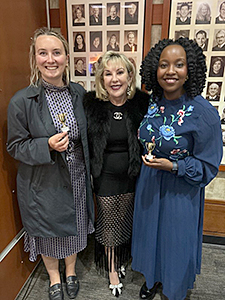 Considering the vast size of the nation and the variations in law and legal practice across states, I initially struggled to envision how the US cultivated a unified sense of community within its legal sector. However, in every state, the American Inns of Court proved to be vibrant, supportive, and deeply rooted in fostering connection and collaboration. The Inns originated in the United States in 1985, inspired by the centuries-old tradition of the English Inns of Court. The English Inns have historically served as centres for legal training and professional development, with a focus on mentorship, financial support and developing the advocacy skills of barristers at every level. Recognising the value of this model, a group of American legal professionals sought to create a similar network to enhance the quality of legal practice in the US. The American Inns of Court now operate across the country, offering a platform for judges, lawyers, and law students to engage in meaningful dialogue, share experiences, and refine their legal skills. As part of the Pegasus programme, we had the opportunity to experience the camaraderie of the American Inns of Court in a series of Inn meetings.
Considering the vast size of the nation and the variations in law and legal practice across states, I initially struggled to envision how the US cultivated a unified sense of community within its legal sector. However, in every state, the American Inns of Court proved to be vibrant, supportive, and deeply rooted in fostering connection and collaboration. The Inns originated in the United States in 1985, inspired by the centuries-old tradition of the English Inns of Court. The English Inns have historically served as centres for legal training and professional development, with a focus on mentorship, financial support and developing the advocacy skills of barristers at every level. Recognising the value of this model, a group of American legal professionals sought to create a similar network to enhance the quality of legal practice in the US. The American Inns of Court now operate across the country, offering a platform for judges, lawyers, and law students to engage in meaningful dialogue, share experiences, and refine their legal skills. As part of the Pegasus programme, we had the opportunity to experience the camaraderie of the American Inns of Court in a series of Inn meetings.
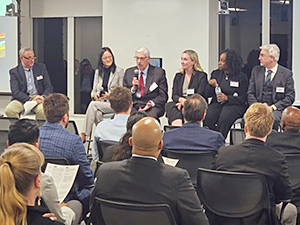 In California, we had the privilege of attending the infamous ‘Hammy’ awards hosted by the Anthony M. Kennedy Inn, followed by an ethics skit performed by students, attorneys and judges to prompt discussions about the pitfalls often encountered in practice. The Phoenix experience also offered a glimpse into the communal spirit of the legal profession through the American Inns of Court. Dinners with the Thurgood Marshall, Lorna Lockwood, and Horace Rumpole Inns of Court highlighted the collegiality that underpins the legal community in Arizona. In Maryland a Thanksgiving-themed meeting with the Cawood Inn of Court provided a thoughtful exploration of the state’s expanding employee protections, and the Linn Inn meeting at the Kraft Heinz headquarters in Chicago enabled us to participate in a presentation comparing US and UK advocacy styles, providing a thoughtful perspective on both the commonalities and differences in our legal traditions.
In California, we had the privilege of attending the infamous ‘Hammy’ awards hosted by the Anthony M. Kennedy Inn, followed by an ethics skit performed by students, attorneys and judges to prompt discussions about the pitfalls often encountered in practice. The Phoenix experience also offered a glimpse into the communal spirit of the legal profession through the American Inns of Court. Dinners with the Thurgood Marshall, Lorna Lockwood, and Horace Rumpole Inns of Court highlighted the collegiality that underpins the legal community in Arizona. In Maryland a Thanksgiving-themed meeting with the Cawood Inn of Court provided a thoughtful exploration of the state’s expanding employee protections, and the Linn Inn meeting at the Kraft Heinz headquarters in Chicago enabled us to participate in a presentation comparing US and UK advocacy styles, providing a thoughtful perspective on both the commonalities and differences in our legal traditions.
An Unusual Trip and Some Cultural Experiences
A visit to the Federal Bureau of Investigation in Chicago offered a rare behind-the-scenes perspective on federal law enforcement. From specialised training programmes to protocols ensuring appropriate use of force, the tour revealed the meticulous processes that underpin the FBI’s operations.
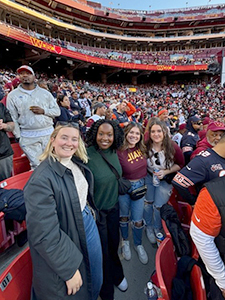 Our schedules also allowed us to become even more immersed in US culture and history. From the Smithsonian museums to the Art Institute of Chicago, from a thrilling NFL game between the Washington Commanders v Chicago Bears to a Washington Wizards v Golden State Warriors basketball game, the American spirit was palpable and the energy contagious!
Our schedules also allowed us to become even more immersed in US culture and history. From the Smithsonian museums to the Art Institute of Chicago, from a thrilling NFL game between the Washington Commanders v Chicago Bears to a Washington Wizards v Golden State Warriors basketball game, the American spirit was palpable and the energy contagious!
Reflections: Lessons and Legacy
The scholarship was a truly remarkable programme. The whole experience proved challenging, enlightening, fascinating and in so many ways, incomparable to any programme I’ve had the privilege of undertaking.
It deepened my appreciation for the progress made in the US in addressing and reconciling the legal system’s historic inequities and its ongoing journey toward a more fair and inclusive system. It helped to highlight the importance of global dialogue and exchange, as I reflected on how the legal profession could be more diverse in my own jurisdiction.
Each location provided a distinct and unique perspective on the American legal and political systems, enriching my understanding of their nuances and reinforcing the importance of collaboration and cultural competence as critical skills in the legal profession.
It was also clear that there are universal challenges faced by legal systems worldwide, such as ensuring access to justice, helping marginalised communities and embracing diversity. Observing innovative approaches to addressing these challenges like the specialised courts in Arizona, was particularly illuminating in showcasing the power of creative problem-solving in delivering justice. Overall, the connections I have forged, and insights gained will undoubtedly influence my approach to advocacy and law for years to come.
A Note of Thanks
California: Huge thanks to Justice Art Scotland who carefully curated the California programme, and arranged an array of meetings, lunches and social events to provide extensive exposure to California’s legal and legislative systems. Each meeting we had was borne out of Art’s personal relationships with judges and attorneys alike. They comprised a vast range of colleagues who he had championed and supported who, in turn, were willing to support Justice Scotland’s desire to make our time in California a memorable one. I’m also grateful for the warm hospitality of Parker White, Dr. Carole McCook and their family, who opened their homes to us. Their generosity extended to a memorable weekend trip to Lake Tahoe and the opportunity to share some of the finest Champagne I’ve ever had! Special thanks are also due to Magistrate Judge Chi Soo Kim, Judge Lauri Damrell, Judge Jill Talley, Chris Whelan (especially for the pistachios), and others for their time and thoughtfulness.
Phoenix: A special thanks to John De Stefano, who provoked our thinking on what it means to be a Pegasus scholar, by encouraging us to reflect on the significance of the programme and consider how we take our learning and invest in the development of future generations of legal practitioners. Thanks also to Dan Barr, Judge Boyle and Judge Logan for their time, expertise and counsel.
Washington DC: Thanks to Cindy Dennis for your passion to make this experience so memorable and for overseeing the Pegasus programme, to Ellen and Tim DelSole for their hospitality, General Malinda Dunn for hosting the Pegasus reception, Britta Venneman and Jesse Binnall for organising the various DC meetings and activities, and countless others who gave their time.
Maryland: A heartfelt thanks to Professor Kim Fullerton, Jason Steinhardt, and Marot Williamson for organising such a comprehensive visit to Maryland.
Chicago: A final thank you Peggy Herrmann for organising an exceptional week, Julianne Hartzell for hosting us in Bucktown, and Adam and the Kelly family for their hospitality in Winnetka. Additional thanks to Olivia Bedi and the Linn Inn community for their warmth and generosity during our time in Chicago.
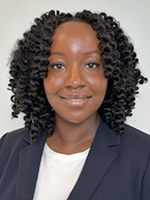 Afiya Amesu is a barrister at No5 Chambers, and practises in Personal Injury, Clinical Negligence and Employment Law. She advises and represents both Claimants and Defendants, appearing in court regularly. Her work includes representing bereaved families at clinical negligence and personal injury inquests, unfair dismissal, whistleblowing and discrimination claims in the employment tribunal, and personal injury matters.
Afiya Amesu is a barrister at No5 Chambers, and practises in Personal Injury, Clinical Negligence and Employment Law. She advises and represents both Claimants and Defendants, appearing in court regularly. Her work includes representing bereaved families at clinical negligence and personal injury inquests, unfair dismissal, whistleblowing and discrimination claims in the employment tribunal, and personal injury matters.
Afiya read Law at University College London (UCL) where she was awarded the Leonard Sainer Scholarship to undertake the LLM in Legal Practice at BPP University. In her master’s degree she achieved a distinction and was awarded the highest mark in the year for her dissertation. During her LLM Afiya won the inaugural 36 Group Advocacy Competition, was awarded the Ede & Ravenscroft Prize for her participation in the Middle Temple Rosamund Smith Moot, and was a prize winner in the Times Law Awards Competition 2021.
Prior to becoming a barrister, Afiya worked as a legal assistant for a barrister at Garden Court Chambers during her undergraduate studies. She further enriched her experience by working at the UCL Legal Clinic as a legal fellow, representing Claimants in welfare and disability claims.
Outside of her work at the Bar, Afiya is co-founder of ‘She Leads for Legacy’, a social enterprise dedicated to empowering Black women and Allies in the workplace. Through She Leads for Legacy, Afiya has worked with the Greater Manchester Combined Authority to deliver a civic leadership programme for leaders in Manchester, spear-headed a fully funded coaching programme for Black women in the Northwest. The organisation has partnered with a number of leading universities to carry out research on the experiences of minorities in the workplace. Afiya's commitment to empowerment extends to the global stage, where she has delivered a Tedx Talk on the importance of acknowledging the unique stories of individuals from marginalised communities.